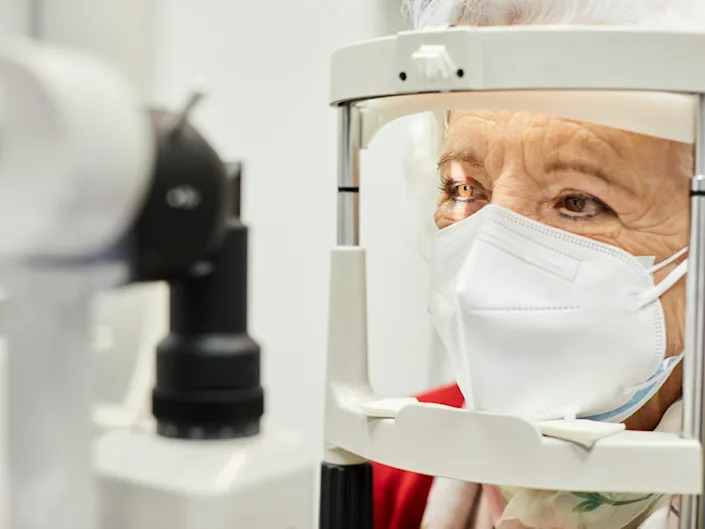Artificial intelligence could be used to detect heart disease from an eye scan, scientists say
SOURCE: YAHOO.COM
JAN 27, 2022

Eye scans could be used to predict the likelihood of a heart attack, scientists say.
AI that analyzes blood vessels could be used by opticians to screen for heart disease, they said.
Heart disease is the leading cause of death in the US, according to the CDC.
Artificial intelligence could detect early signs of heart disease during routine trips to an optician, a group of researchers has said.
A study, led by Leeds University and published in Nature Machine Intelligence Tuesday, found that a new AI system that examined eye scans was about 70% accurate at predicting a heart attack within the next 12 months, according to the researchers.
Currently, doctors estimate someone's risk of a heart attack in the next ten years using tools that take into account parameters such as age, gender, smoking history, cholesterol and blood pressure.
The use of AI with eye scans could help determine more accurately the risk of someone having a heart attack, allowing heart disease treatment to be started earlier, the study authors said.
Heart disease is the leading cause of death in the US, according to the Centers for Disease Control and Prevention. "Heart disease" refers to several types of heart conditions. The most common type of heart disease is coronary artery disease, which can lead to heart attack, the CDC says.
Alex Frangi, study lead author and a Turing Fellow at the Alan Turing Institute, said in a statement that the technique could revolutionize the screening of heart disease.
"Retinal scans are comparatively cheap and routinely used in many optician practices. As a result of automated screening, patients who are at high risk of becoming ill could be referred for specialist cardiac services," Frangi, the Diamond Jubilee Chair in Computational Medicine at Leeds University, said.
The new system uses images of the retina to estimate the size of one of the heart chambers, the left ventricle, and the blood pressure in it. It uses this information, combined with demographic data, to predict the likelihood of a heart attack within the next 12 months.
When someone develops heart disease, the left ventricle enlarges and its blood pressure – measured when the heart is relaxed – increases as the ventricle becomes a less efficient pump. These features are usually detected with investigations such as an electronic heart trace or a heart scan.
The researchers trained the AI system using retinal images and demographic data — such as gender, smoking and alcohol consumption — from more than 5,600 people, the study authors said. They excluded people with diabetes, a condition that also causes changes to blood vessels in the eye.
The study authors cautioned that the technique was "less powerful" in identifying heart attack risk in individuals with larger left ventricles and higher ventricular blood pressure. The models hadn't been trained for this and retinal images don't contain all the information about the heart, they said.
The method was also less accurate for people with age-related macular degeneration, a common eye condition when part of the retina gets damaged, they said.
Frangi told Insider that the data was acquired in "very realistic conditions", but it wasn't yet clear how well the technology would perform in a high-street optician.
"Those questions will need to be explored in a prospective trial once a pre-commercial prototype has been built and evaluated." he said, adding that it would also need to satisfy all required regulations.
The scientists will now look at genetic data to try to make the heart disease predictions more accurate, a "crucial step towards delivering personalized medicine", they said.
Read the original article on Business Insider
LATEST NEWS
Augmented Reality
Hi-tech smart glasses connecting rural and remote aged care residents to clinicians
NOV 20, 2023
WHAT'S TRENDING


Data Science
5 Imaginative Data Science Projects That Can Make Your Portfolio Stand Out
OCT 05, 2022

AI Is Set To Change Fertility Treatment Forever
SOURCE: HTTPS://CODEBLUE.GALENCENTRE.ORG/
NOV 06, 2023
AI-empowered system may accelerate laparoscopic surgery training
SOURCE: HTTPS://WWW.NEWS-MEDICAL.NET/
NOV 06, 2023
Here’s Everything You Can Do With Copilot, the Generative AI Assistant on Windows 11
SOURCE: HTTPS://WWW.WIRED.COM/
NOV 05, 2023
Tongyi Qianwen, An AI Model Developed By Alibaba, Has Been Upgraded, And Industry-specific Models Have Been Released
SOURCE: HTTPS://WWW.BUSINESSOUTREACH.IN/
OCT 31, 2023
Stability AI Launches Stable Audio — Generate Music Using Artificial Intelligence
SOURCE: HTTPS://WWW.DIGITALMUSICNEWS.COM/
SEP 13, 2023
Ikigai Labs: $25 Million Raised To Advance Generative AI For Tabular Data
SOURCE: HTTPS://PULSE2.COM/
AUG 27, 2023




